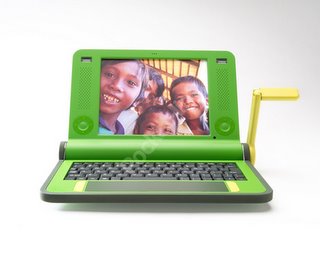Cranking Across the Digital Divide
While American journalists spent much of the past week navel gazing and worrying about what it means when Bob Woodward gets embroiled in the Valerie Plame mess, they spent precious little time noticing what may be the biggest story in communications: efforts to cross the digital divide.
In Tunisia, people from around the world gathered for The World Summit on the Information Society. It's bold effort was to cross the digital divide and bring Internet communications where they had never been before. But in an ironic twist, the Tunisian government shut some people out, including the head of Reporters without Borders, and turned others off. The conference ended with some toothless speeches promising more progress but offered up little by way of true action or funding to get anything done.
Lots of talk, little accomplished. But credit where credit is due. At least there was talk. Back in my neighborhood, MIT unveiled a PC that can change everything. A $100 laptop designed for children's fingers, complete with a crank to help it run even when and where there is no power. It has a wireless connection device so the laptops themselves can become their own network, it's rugged and has a screen that can go from color to black and white to be easier to read.
Back in my neighborhood, MIT unveiled a PC that can change everything. A $100 laptop designed for children's fingers, complete with a crank to help it run even when and where there is no power. It has a wireless connection device so the laptops themselves can become their own network, it's rugged and has a screen that can go from color to black and white to be easier to read.
Why can this change everything? Because it enables communications, and that is more subversive to a dictatorship or corrupt government than any weapon. If the US truly wants to help the world understand and embrace democracy, it should be investing heavily in communications and devices such as these.
But a laptop alone isn't enough, it must come with education so children not only learn what the technology is but how to use it. They must gain the math and science skills they need to truly enter the tech economy. This as true in the US as it is in Africa.
The Red Herring, meanwhile, is running a story this week on the untapped telecom market in Africa. I also have a client talking about Africa as the next China. That is, Africa is starting to earn its stripes as a source for apparel manufacturing, shipping directly to retailers in the US. This is the first step in a long journey that the US and Japan have traveled already. It starts with high-volume, low margin goods that offer better pay for the people. They can then earn greater education and move to the next step of manufacturing, such as automotive and electronics, eventually building a tech-based economy.
And it all starts with communications so they can reach out and talk to each other and become part of the global marketplace.
And it all starts with a crank. This story is bigger than Woodward.




No comments:
Post a Comment